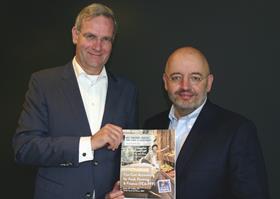
Financial auditor EY and sustainability consultant Soil & More have teamed up to develop a way for small and medium-sized enterprises to calculate the hidden costs of food production on people and planet, including its effect on the climate, health, water quality and soil erosion.
To illustrate the method, the team has calculated the impact of organic distributor Eosta, resulting in data for nine types of produce and a True Cost Profit & Loss statement.
The study, which was presented this week at the EAT Food Forum in Stockholm, showed sizeable differences between organic and non-organic production in terms of the impact on soil and health.
Eosta’s CEO, Volkert Engelsman, presented the report ‘True Cost Accounting for Food, Farming and Finance’ to Peter Bakker, president of the World Business Council for Sustainable Development (WBCSD).
Bakker commented: “The results for the business case of Eosta in this report illustrate how True Cost Accounting changes the definition of profit and tackles perverse incentives. I predict that True Cost Accounting will seriously affect the valuation of companies and their access to capital within a few years.”
The study, which was supported by Triodos Bank and Hivos, calculated the cost of water pollution, pesticide exposure, greenhouse gas emissions and soil erosion. The organic products involved in the study included Argentine apples, Dutch carrots and Kenyan avocados, with their impact compared with conventional products from the same supplier or the same region.
The report also included an Integrated Profit and Loss statement for Eosta, one of the first to be published for an SME anywhere in the world.
“We have developed a practical dashboard for small and medium-sized enterprises in the food, farming, and finance sectors that monetises the hidden impacts of food production on people and planet,” explained Engelsman. “The underlying sustainability model is the Sustainability Flower, which defines Key Performance Indicators (KPIs) for both social and ecological aspects. We asked EY to focus on the 20 per cent of the KPIs that represent 80 per cent of the impact. The pilot is obviously far from complete, but we want to be pragmatic and act. We need to empower consumers and stakeholders, including the finance sector, to act responsibly and make informed business decisions.”
Bakker said that the pilot has created a new benchmark for the market. “I hope that others will follow and scale it up,” he added. “The systems failure of our present economic system, leading to multiple crises, forces us to redefine profit, and True Cost Accounting is an important tool to achieve that goal. This pilot has provided us with a practical and integrated approach.”
Engelsman said that the response of the food, farming and finance sectors had been overwhelmingly positive. “Companies are lining up to apply this method to their own businesses,” he said. “We are looking forward to close cooperation with research institutions, as well as SMEs such as Lebensbaum, Ritter Sport, Alnatura and the GLS Gemeinschaftsbank Germany, who have all expressed a strong interest in the new dashboard.”






No comments yet